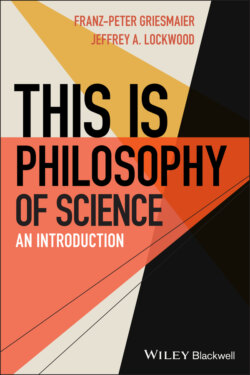Читать книгу This is Philosophy of Science - Franz-Peter Griesmaier - Страница 6
PREFACE
ОглавлениеMore in need of philosophy are the sciences where perplexities are greater.
— Carlo Rovelli, Codeveloper of loop quantum gravity
You are an unusual student. We’ d be surprised if 1% of STEM majors (or even most philosophy majors) take a course in the philosophy of science. And this is an unusual book in three ways which we hope will provide a readable college text.
First, most philosophy of science texts are written for philosophy majors. While this book will provide them with a solid foundation, our goal is to provide STEM majors with a relevant book. But why would they seek such a text?
Imagine that there is an opera singer who hits every note, but she has no understanding of the composition. Is she truly a musician or just a performer? In German, a Musiker has a deep understanding of music, while a Musikant merely plays music. Understanding the philosophy of science is necessary to become a scientifiker rather than a scientifikant (these terms don’t really exist but you get the idea).
Second, the coauthors are an odd couple. FPG is an immigrant and first-generation college student whose educational path led him to teach philosophy to hundreds of students. JAL was a faculty member in entomology for nearly 20 years before joining the philosophy department. As such, the authors have been there, with “there” being a classroom where you wonder if you belong and an academic setting where you are an outsider.
This text would’ve been easier to write alone, without the philosopher nitpicking the scientist’s versions of concepts or the scientist revising the philosopher’s accounts of empirical research. We crafted this book together so as to respect the intellect of the student and recognize the unfamiliar practice of thinking about the nature of knowledge and reality.
Third, this book is a kind of chimera structured around two of philosophy’s core disciplines – epistemology and metaphysics (an unconventional framework) – with lots of historical and contemporary examples from the sciences, including the physical (from cosmology to geology), biological (from ecology to medicine), and social (from anthropology to economics). We recognize that the science–philosophy interface requires intriguing case studies (e.g., time travel) to illustrate abstract concepts because if a student is not engaged, then the book is just filling space.
We should also note what is missing from this text. Apart from the need to forgo covering every important view on the topics we chose to treat (such as the kairetic account of explanation), there is also no systematic treatment of ethical, social, religious, and political questions. This absence is not intended to suggest that the cultural context of science is unimportant, but that an exploration of the values–science interface warrants an entire text.
We agree with Carlo Rovelli, theoretical physicist writing for Scientific American, who argued that:
Philosophy provides guidance how research must be done. Not because philosophy can offer a final word about the right methodology of science [but] because the scientists who deny the role of philosophy in the advancement of science … are the ones trapped in the ideology of their time.
But not only science should take account of philosophy. As Rovelli continues: “Just as the best science listens keenly to philosophy, so the best philosophy listens keenly to science.” We hope that this text fosters such mutual respect among students majoring in philosophy and STEM fields.
